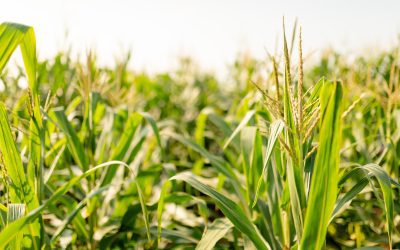The National Corn Growers Association (NCGA) recently launched Consider Corn Challenge III, an open-innovation contest seeking participants to submit proposals for new uses of field corn as a feedstock for producing sustainable chemicals and products with significant market demand.
“Corn is an affordable, abundant, sustainably grown crop that has a myriad of uses and applications, which is why we are holding our third Consider Corn Challenge contest,” said Bob Hemesath, chair of the NCGA’s Market Development Action Team (MDAT) and an Iowa farmer. “Corn’s cost as a feedstock has benefited greatly by improvements in technology, production and logistics efficiency. With society’s interest in more biobased products, we know we have the solution and that’s corn.”
Previous winners of the Consider Corn Challenge contests have scaled up to the next phase of development, received additional grant funding, entered into joint agreements, and obtained registration for state biobased production incentives.
Consider Corn Challenge II winner Derek Wells from ExoPolymer said he has experienced many benefits from participating in the Challenge. ExoPolymer, Inc. intends to create a new profile of customizable, polysaccharidebased hydrocolloids that are domestically produced by microbial fermentation using corn sugar as a feedstock. These new hydrocolloids will meet the growing needs and performance gaps in the healthcare, personal care, food, pharmaceutical and energy industries.
“As a past recipient of the Consider Corn Challenge award from the NCGA, we have been able to deepen our technology base regarding the differential properties of our novel materials,” said Wells. “Due to these efforts, we are currently investigating several targeted market applications and feasibility studies at scale. The CCC award also helped to put a spotlight on our innovative approach, enabling us to raise additional funding and continue our progress. We are grateful for the recognition by the NCGA and are looking forward to further applying our technology for additional valuable uses of this important agricultural product.”
If all nine winners of the first two Consider Corn Challenges reached full commercialization with products available in the marketplace, the potential for additional corn demand could be approximately 2.9 billion bushels.
“Corn farmers continue to take advantage of the technology that allows them to grow a bigger crop on less land with less resources per bushel, and that means there’s enough carryout available to meet the needs for food, feed, fuel and new uses,” Hemesath said. “This contest is a way to help us think outside of the box and meet the needs of our customers, who are asking for sustainable, biobased products.”
One to six winners will be selected with a total prize pool of $150,000, split equally between winners. The submission deadline is June 3, and winners will be announced in September. Learn more about the Consider Corn Challenge III submission process by visiting ncga.com/key-issues/ other-topics/new-uses
“We’ve had very diverse and robust applications and winners from the previous two Consider Corn Challenges, and I am looking forward to seeing who is working on a technology that can utilize field corn as a feedstock for producing sustainable chemicals and products with quantifiable market demand,” said NCGA Director of Market Development Sarah McKay.
Specific application areas being considered for this Challenge include:
• Biobased materials from novel mixes of corn-derived plastics
• Compostable plastics with high tensile strength, such as netting or packaging materials
• Heavy-duty fuels or drop-in chemicals, such as sustainable aviation fuel or biodiesel derived from corn glucose
• Carbon fiber
• Other high-value molecules
Department of Energy driving demand
An important step forward to driving demand for corn was recently achieved, thanks to the work of state and national corn growers’ staff and members of the NCGA’s MDAT.
In the most recent Funding Opportunity Announcement (FOA), the U.S. Department of Energy’s (DOE) Bioenergy Technologies Office (BETO) clarified that corn grain is an acceptable feedstock. This means that starch-derived sugars, specifically starches from field corn, were clarified as acceptable a manufacturing material, such as a renewable source for making new plastics.
“This is an important evolution in how DOE interprets legislative intent,” said McKay. “Given U.S. corn growers’ ability to efficiently produce, it is clear that corn can not only meet the needs of existing markets but can enable exciting new markets for renewable materials. We are excited to continue working with BETO and other government agencies to lay the groundwork and develop a solid foundation for future markets for corn.”
BETO works to develop industrially relevant technologies to enable domestically produced biofuels and bioproducts.
“We really appreciate the time that the senior leadership at DOE took to discuss policy with us, and we are looking forward to seeing new research focused on corn renewable chemicals,” said Dan Wesely, Chair of the NCGA Market Development Action Team.
The timing of this announcement is important because it means those looking for funding opportunities through BE- TO’s Plastics Innovations Challenge can use corn as a base for recycling technologies in the manufacture of new plastics.
“One of the primary areas of potential is in bioplastics,” McKay added. “Now, BETO is able to use corn grain for agency funding and testing in national laboratories. Corn is an abundant, affordable, sustainably produced product, making it a competitive crop to use for bioplastics and other bioproducts.”
An example of a product that could now be developed to use corn grain as an industrial feedstock ingredient is singleuse plastics such as water bottles and plastic bags. Learn more about corn as an industrial feedstock and NCGA’s initiatives around new uses at ncga.com/newuses




